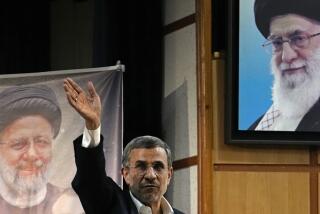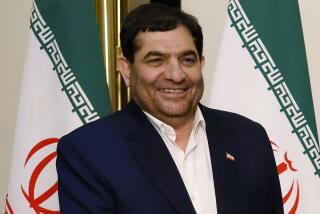Ahmadinejad to retain Iranian foreign minister, a move likely to reassure Western diplomats
- Share via
BEIRUT — Iranian President Mahmoud Ahmadinejad will renominate Manouchehr Mottaki as foreign minister, an advisor said Wednesday, a move that suggests the Islamic Republic will not harden its already tough posture in negotiating with the West.
Meanwhile, Syrian President Bashar Assad, fresh off what France described as his successful efforts to help secure the release of two French nationals held in Iranian prisons, arrived in Tehran to meet with supreme leader Ayatollah Ali Khamenei and Ahmadinejad, the official Islamic Republic News Agency said.
Assad reportedly is the second head of state to visit Iran since Ahmadinejad’s disputed June 12 reelection, which sparked weeks of unrest and violence. Iranian officials have dismissed suggestions that Damascus, which maintains strong relations with Tehran, played a role in getting French researcher Clotilde Reiss and French Embassy staffer Nazak Afshar out of prison on bail pending verdicts on espionage charges.
Ahmadinejad was required by law to formally submit the names of his Cabinet nominees to lawmakers Wednesday but had not done so by the time they finished their work in the evening. The delay suggested disarray within his administration; even the list of names released by the aide was incomplete.
Lawmakers will debate the Cabinet’s merits next week and a vote of confidence is slated for Aug. 30.
A rejection of the lineup could further weaken a president already considered illegitimate by some Iranians.
Parliament members are girding for a fight over Cabinet members, complaining that Ahmadinejad failed to meet their minimum requirement to avoid a protracted battle: conferring with them on nominees beforehand. Leading conservative lawmaker Ahmad Tavokoli noted this week that some of the people Ahmadinejad was talking about lacked “a single day” of administrative experience.
Ahmadinejad’s Cabinet picks include three women, a first for post-revolutionary Iran, but many others expected to be named already serve as ministers.
In addition to Mottaki, the Iranian president will nominate the incumbent defense minister to the Interior Ministry, which oversees parts of the security forces and organizes elections, and the commerce minister to lead the Oil Ministry for the world’s fourth-largest exporter of crude petroleum, said Iraj Nadimi, an advisor to Ahmadinejad’s vice president for parliamentary affairs, according to the Iranian parliament’s website.
No women served in Ahmadinejad’s first government and only one served as a vice president in the Cabinet of his predecessor, Mohammad Khatami. Ahmadinejad picked women to lead the ministries of welfare, health and education, Nadimi said.
Some were perplexed by his choices of the women. Though it was seen as an attempt to woo an increasingly powerful and politically active constituency hostile to Ahmadinejad, analysts predicted that hard-liners such as proposed Health Minister Marzieh Vahid Dastjerdi, an obstetrician who has advocated segregation of the sexes in Iran’s hospitals, will further alienate Iran’s increasingly modern women.
European diplomats were alarmed by the possibility that Ahmadinejad would propel one of his radical allies to the nation’s top diplomatic post, with the possibility of negotiations over Iran’s nuclear program. Western officials have said they would be reassured by the continued presence of Mottaki, a relatively soft-spoken and experienced diplomat who received his undergraduate degree in India, speaks English and has been described as levelheaded by counterparts.
His retention surprises analysts who had detected strained relations between Ahmadinejad and Mottaki, a political conservative who served as a campaign manager for a rival to the president in 2005.
“Mottaki in the second term means the foreign policy will be the same as it has been over the past four years,” said Ahmad Bakhshayesh, a political scientist in Tehran. “Because now we see the rift in the ruling establishment, continuity in foreign policy can give President Ahmadinejad a break amid his domestic problems.”
Though presidents name Cabinet ministers, the chiefs of crucial ministries such as interior, intelligence and foreign affairs often require the approval of Khamenei.
--
Special correspondent Ramin Mostaghim in Tehran contributed to this report.
More to Read
Sign up for Essential California
The most important California stories and recommendations in your inbox every morning.
You may occasionally receive promotional content from the Los Angeles Times.










